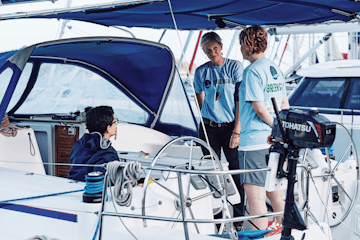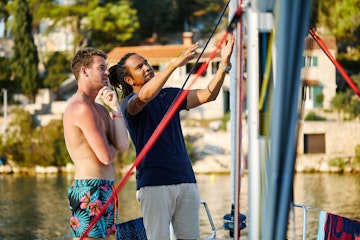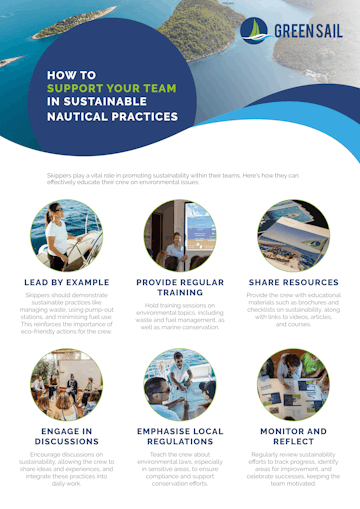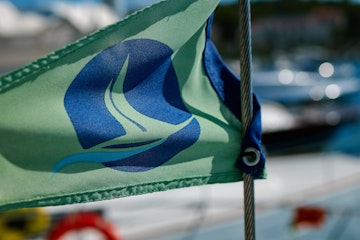Why Environmental Responsibility is the Future of Charter Operations

The charter industry is at a crossroads. With stricter EU regulations coming into force and travellers increasingly seeking eco-friendly experiences, we're facing a dual challenge: protecting the stunning natural environments we depend on whilst staying competitive in an evolving market.
The solution? A comprehensive environmental policy that's not just a tick-box exercise, but a genuine commitment to sustainable operations.
What Makes an Environmental Policy Actually Work?
A proper environmental policy isn't about gestures or greenwashing. It's about creating clear expectations for everyone involved, from skippers and crew to base managers and technical teams. This requires a comprehensive plan that outlines specific activities, timelines, resource allocations, and reporting requirements for all staff members. The best policies focus on practical outcomes that make a real difference
Your policy should help your company operate with long-term sustainability in mind, protect unique ecosystems, use natural resources responsibly, preserve the cultural and scenic value of the places you visit, and build environmental awareness throughout your team.

The Principles That Matter
Effective environmental policies are built on solid foundations. Prevention is always better than a cure, so focus on avoiding damage before it happens. When in doubt, err on the side of caution and avoid activities that could cause harm.
The polluter pays principle means taking responsibility for any environmental impact you create. Base your decisions on scientific evidence and professional knowledge, and remember that protecting the environment is a team effort involving everyone from operators to scientists to the public.

Four Areas Where You Can Make a Real Impact
Waste and Pollution
The goal is simple: reduce the amount of solid and liquid waste your operations produce. Black and grey water should only be emptied at official pump-out stations, never into the sea unless it's absolutely necessary and legally permitted, and then only far from the coast. This protects fragile marine areas and keeps our coastlines pristine.
Energy and Fuel
Set clear targets for reducing fuel consumption. Better route planning, regular engine maintenance, and solar panels can make a huge difference. Many boats now use solar power for lighting and refrigeration, cutting diesel dependency significantly.
Encourage skippers to sail whenever possible, avoid rough conditions that burn more fuel, and switch off engines when docked or anchored. Avoiding lengthy queues outside marinas also helps conserve fuel.
Water Conservation
Install water-saving taps and showers as standard. Brief guests on taking shorter showers, using eco-friendly cleaning products, and turning off taps when not needed. Track water usage throughout the season and aim for measurable reductions year on year.
Marine Ecosystem Protection
Smart anchoring makes all the difference. Use mooring buoys where available or anchor in sandy areas rather than sensitive seagrass meadows like Posidonia. Educate guests not to feed marine life, avoid shining lights into the water at night, and report any pollution or endangered species sightings.
Using Data to Drive Improvement
Green Sail has been tracking emissions for charter companies including Sail Croatia, NCP & Mare, More Yacht Club, Euromarine, ACE Yachting, Candor Charter, Euronautic, Adriatic Sailing, and Pitter for several years now.
By measuring CO2e emissions from fuel, water, and electricity consumption, these companies can identify exactly where they're excelling and where improvements are needed. This data-driven approach ensures resources are directed towards the most impactful changes. We offer this as part of our Green Sail Footprint program.

Everyone Has a Role to Play
Skippers choose fuel-efficient routes, promote sailing over motoring, and educate guests about environmental best practices.
Crew members manage waste properly and ensure resources aren't wasted through careless use. Base managers ensure teams are properly trained, equipment is maintained, and regulations are followed to the letter.
Technical teams maintain solar systems, engines, and batteries, using digital monitoring tools to optimise performance.
Cleaning teams use bio-friendly products, conserve water when washing vessels, and recycle waste correctly.
Marketing and admin teams inform guests about sustainability efforts and encourage active participation.

What Success Actually Looks Like
You'll know your policy is working when you see less unrecycled waste, improved energy efficiency, smarter water usage, and more eco-friendly anchoring practices. But the real measure of success is cultural: creating an environment where everyone, from staff to guests, takes active responsibility for environmental protection.
Guests appreciate high standards, and these are a measure of a successful company. Some companies recognise and reward staff who go above and beyond, creating positive reinforcement for environmental stewardship.
Perhaps most importantly, there's the deep satisfaction that comes from knowing your company has done everything it can to protect the sea through responsible choices, committed action, and a genuine dedication to sustainability.

Environmental responsibility isn't just about doing the right thing (though it absolutely is that). It's a smart business strategy. Today's travellers want experiences that align with their values. They want assurance that their holiday isn't harming the environment and that the companies they choose genuinely care about the destinations they visit.
A strong sustainability focus helps charter companies differentiate themselves and remain competitive as environmental awareness continues to grow.
Ready to develop or improve your environmental policy? Get in touch and we'll help you create a programme that works for your business and the environment.